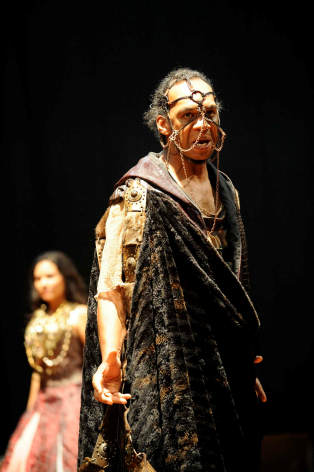Other Links
Editorial Board
- Editor - Bill Kenny
Founder - Len Mullenger
Google Site Search
SEEN
AND HEARD INTERNATIONAL OPERA REVIEW
Handel, Tolomeo, Re di Egitto:
Soloists,
Orchestra Collegium Marianum Prague. Conductor: Carlos Aragón.
Teatro Arriaga de Bilbao. 19.10.2008. (JMI)
New Production.
Direction: Curro Carreres.
Sets and Costumes: Juan Sebastián Domínguez.
Lighting: Eduardo Bravo.
Cast:
Tolomeo: Flavio Oliver.
Seleuce: Maria Grazia Schiavo.
Elisa: Soledad Cardoso.
Alessandro: Filippo Mineccia.
Araspe: Iván García.

Picture © E. Moreno Esquibel
It seems to be a new fashion, this
recovery of forgotten baroque operas, and this year seems to be a
Tolomeo year: it will be also offered in concert at Madrid
Teatro Real in a few months, in a tour by Alan Curtis and his
Complesso Barroco. This Bilbao Tolomeo was a separate staged
performance of Tolomeo and the first ever in Spain, where it has
arrived after a delay of almost 300 years.
More than one aficionado might think that the
Tolomeo is no other than the brother and husband of queen
Cleopatra, as is shown in the opera Giulio Cesare. This is not him
however, but a son of Cleopatra, although he was never king of Egypt
in reality. At the death of the Caesar and Marc Antonio,
Cleopatra‘s “Roman” children were taken to away to Rome. Of the
other three children, Cleopatra Selene married the King of
Mauritania, after which her brothers Tolomeo and Alessandro, the
protagonists in this opera, apparently also decided to go to
Mauritania to live with their sister. A new Tolomeo, son of
Cleopatra Selene, succeeded his mother to the throne of Mauritania
until Caligula decided to end his life.
So this Tolomeo is not based in historical grounds: instead
it is just the excuse for a complicated and unbelievable love
story, with beautiful music here and there, although not at the
height of the other great masterpieces by the composer. It served
as a vehicle for the famous castrato Senesino, who sang the first
Tolomeo.
This new production of Curro Carreres is simple and effective with
doses of action and good taste and without any particularly original
dramatic concepts behind it. It has very simple sets, consisting of
a cyclorama at the back of the stage and with some elements of
atrezzo. The costumes are rather confusing, since they come
from different periods. On the one hand, Tolomeo and his beloved
Seleuce are dressed by characters from ancient time, Araspe, the
king of Cyprus, looks more like an African while Alessandro,
Tolomeo’s brother, wears modern army uniform, and is always followed
around by soldiers with machine guns. The truth is though, that the
opera’s plot is so weak that these time confusion have no real
importance. I am becoming so used to these rarities in concert
version however that I appreciate any effort in the theatre and
while the production serves the opera very effectively, it does
offers nothing outstanding. There was particularly good lighting by
Eduardo Bravo, as is more than usual from him.
Carlos Aragón is not a very well-known conductor. Until now his
work has consisted of being assistant of high profile Maestros and
he came as a pleasant surprise in the role of musical director has
been a without any hint at all of his possible inexperience. On the
contrary, he was always in full control of the opera, in a very
lively and very convincing reading from Prague’s Collegium Marianum.
In short, this was a sparkling musical performance.
Countertenor Flavio Oliver was Tolomeo and he also offered a bright
interpretation of the title role. He is a remarkable singer who
looks good on stage. His best moment was the aria during his
death by poison - which later turn out to be only a narcotic to
ensure a happy ending.
Neapolitan Maria Grazia Schiavo was the best singer in the cast. She
has a pleasant voice which is very expressive and has a shining
coloratura. She confirmed the most positive impression she left a
few months ago in both Madrid and Valencia.
Soledad Cardoso was an Elisa poorly
suited to the demands of the character. Bad
girls require more vocal weight than she has and it . seems that
she is not quite mature enough yet.
Another countertenor, Italian Filippo Mineccia, was Alessandro and
passed by without either pain or glory. Venezuelan Iván Garcia
seemed a very strange choice for this kind of music, more Amonasro
or Jack Rance than a baroque bass baritone.
Teatro Arriaga had an unusualfull house for the performance. The
audience was very receptive and warm towards all the artists,
particularly with Schiavo, Oliver and Carlos Aragón.
Jose M Irurzun
